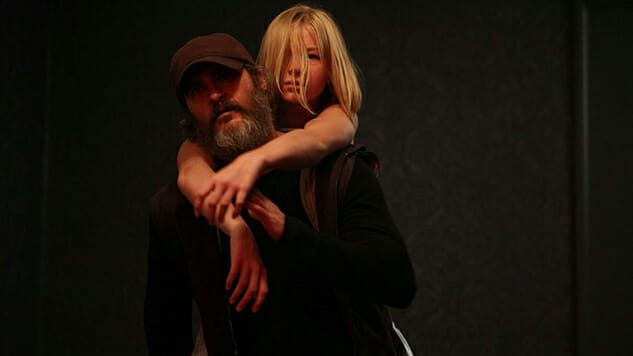Just Like Heaven: Music in You Were Never Really Here

“They said you were brutal,” State Senator Albert Votto (Alex Manette) says to Joe (Joaquin Phoenix). Sorting through photos of the kidnapped girl between his plumb-sized fingers, Joe replies matter of factly, hardly looking at his new client: “I can be.” So begins You Were Never Really Here, and so begins the next mission for the former FBI agent and combat man. Joe lumbers, his mammoth, muscular body, not unlike his hammer—which he wields like Thor does his—juxtaposed with his unkempt hair and his disinclination to enunciate. It’s as if Joe has no connection to his body anymore: Haunted by violence and trauma, he barely sees himself as whole, and director Lynne Ramsay abstains from shooting her Angel of Death in full as well. Though Joe’s life has taken on a routine quality, he wishes to get out of his head so desperately he steps outside of his body and time itself.
Jonny Greenwood’s humming score buoys most of You Were Never Really Here, his obsessive guitar strums and percussive beats augmenting Joe’s restlessness. The sounds in Joe’s head are random thumps, are the sounds of a plastic bag stretching over his head, eyes and mouth, of the train passing by as he contemplates letting his body fall onto the tracks. He could easily picture that kind of self-destruction, giving him a little relief from the agonizing dullness of every day. He takes care of his ailing mother, who reminds him of the past he once had and, without her own awareness, of the trauma he inflicted on him. Images in Joe’s head pop up discontinuously, thuddingly and overwhelmingly.
You Were Never Really Here is not quite that which is advertised —the trailer has a visceral quality, to be sure, but Ramsay’s film isn’t exactly the revenge-thriller its ad campaign suggests, or the Scorsese-ish movie several people have described it as. It’s much quieter, nearly serene, which makes its bouts of violence and pops of sound all the more shocking. Joe’s job as a hired hammer is as soul crushing as if it it were an office job, and then some. The violence he sees and inflicts shapes him, plagues his every waking thought. It occupies his dreams, too.
Ramsay implies that Joe specializes in rescuing young women from sex traffic rings; he’s asked, for his next mission, to find a politician’s daughter. When Joe is in action, though, is when he seems to disassociate entirely. Joe inevitably finds the headquarters of the sex traffic ring, but Ramsay uses security footage from inside and outside of the brownstone to detail Joe’s actions. In stark black and white, looking down on each room from a corner, Ramsay makes this aesthetic choice not just for coverage, but as a suggestion of how much of an out-of-body experience this is for Joe. Over the footage, we hear Rosie & the Originals’ “Angel Baby” in the diegesis of the film. It blips, repeats, loops lines, eschewing linearity or even a consistency of beat.
-

-

-

-

-

-

-

-

-

-

-

-

-

-

-

-

-

-

-

-

-

-

-

-

-

-

-

-

-

-

-

-

-

-

-

-

-

-

-

-








































